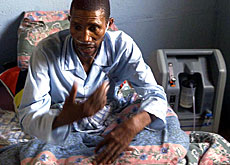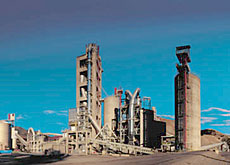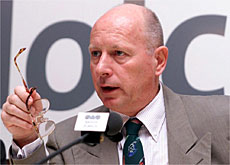Swiss firm faces huge asbestos suit

Swiss multinational Anova is facing claims in South Africa from lawyers representing former asbestos miners.
The action stems from the company’s activities in South Africa, which were terminated at the end of the 1970s.
The case is being led by Richard Spoor, a South African lawyer who has represented asbestos workers against a number of corporations.
His biggest success so far has been the creation of a special fund to help sick ex-miners.
Two mining companies, Britain’s Cape and South Africa’s Gencor, are contributing to the fund as part of settlements with former employees.
Compensation
Both agreements cover a total of 13,500 people who worked in or lived near asbestos mines. Gencor says it has handed over R460.5 million (SFr83 million) to the compensation fund.
With this contribution, the group has freed itself from any further responsibility related to miners’ illnesses or deaths.
In a few weeks time, Spoor is due in Switzerland to meet representatives of the former multinational Eternit, which became Anova.
Eternit is best known for its cement, which was sold around the world.
The company was very active in South Africa until the end of the 1970s through its subsidiary Everite.
Part of the unit was then sold to Cape, which in turn handed it over to Gencor. Another multinational, Group Five, acquired the remaining activities.
Holcim
Since then, Eternit International, owned by Stephan Schmidheiny, has undergone a name change, becoming Anova; while Eternit Switzerland, owned by his brother Thomas, was swallowed up by the Holcim cement group.
Richard Spoor says he is only interested in Anova, now presided over by Hans-Rudolf Merz, who took over from Schmidheiny last summer.
The South African lawyer wants financial compensation for workers who were employees of Everite when Eternit was the main shareholder. Further financial aid could help rehabilitate slag heaps and mining towns.
“We want to talk, not make threats,” said Spoor.
The lawyer blames the mining companies for neglecting the health of their workers – 90 per cent of who were black – and of people living near mines, even though the dangers linked to asbestos were known.
Health fears
Spoor claims an engineer working for Eternit systematically played down the threat to people’s well-being.
“There was a tacit agreement between the authorities and the industry to avoid any measures susceptible to improve the workers’ health,” Spoor told swissinfo.
He adds that the Anova group should accept that it has a social responsibility, in line with the environmental concerns voiced by its former chairman Stephan Schmidheiny.
In his office in Herisau, canton Appenzell Outer Rhodes, Hans-Rudolf Merz confirmed that Spoor would be travelling to Switzerland for talks.
However, Merz said he would not be taking part: “It is too early for me to get involved.”
“We are prepared to talk, but legally I don’t see how Anova can be held responsible since Eternit gave up any control it had 20 years ago,” he told swissinfo.
Settlement
What the Anova chairman doesn’t want is a global settlement. “That would open a Pandora’s box and we would be submerged by demands from around the world,” he added.
Eternit had subsidiaries in 20 countries around the world, and legal proceedings have been launched in Greece, Italy, Brazil and Nicaragua.
Merz intends to identify the plaintiffs individually, determine where they worked and for how long. Anova has set no funds aside for compensation claims.
As far as any South African claims are concerned, the Anova chairman says the company is prepared to face its responsibilities if necessary.
“If there are proven cases of illnesses due to asbestos, I don’t see how we could avoid our responsibility,” he said.
Singled out
Merz feels that the lawyer is targeting one man: Stephan Schmidheiny. “Because he is Swiss, because he is rich, some people want to blame him for all their problems,” he said.
Merz adds that 20 years ago, when Schmidheiny suggested that asbestos should be abandoned, the rest of the industry laughed at him.
According to the Swiss financial magazine, “Bilanz”, Schmidheiny’s decision to get out of the asbestos business dated back to 1976, but it took nearly 20 years to completely pull out.
The Schmidheiny brothers, who held a leading role at Eternit in the 1970s, have begun to leave the business world.
Stephan has retired to Costa Rica, where he runs a development aid foundation, Avina.
His brother, Thomas, announced earlier this month he was giving up his majority voting rights at Holcim, the world’s second-biggest cement maker,
swissinfo, Ariane Gigon Bormann in Zurich, Valérie Hirsch in Johannesburg
Asbestos is a mineral fibre mined mainly in South Africa, Canada and Russia that was commonly used in a variety of building construction materials for insulation and as a fire retardant.
Once they are inhaled, the fibres can remain and accumulate in the lungs.
Breathing high levels of asbestos fibres can lead to an increased risk of lung cancer, mesothelioma (a cancer of the chest and abdominal linings), and asbestosis (irreversible lung scarring that can be fatal).
The risk of lung cancer and mesothelioma increases with the number of fibres inhaled.
Symptoms of these diseases do not show up until many years after exposure begins.
Most people with asbestos-related diseases were exposed to elevated concentrations on the job.
A South African lawyer, Richard Spoor, wants to bring a legal suit against the Swiss multinational, Anova, for claims stemming from asbestos mining.
Two other companies have already reached a settlement with the lawyer, paying to set up a special fund worth SFr83 million for sick miners.
The claim against Anova stems from the activities of Eternit, which had a South African subsidiary until the late Seventies.
Anova’s chairman, Hans-Rudolf Merz, has ruled out a global settlement with South African asbestos workers, but said the multinational is prepared to consider individual cases.

In compliance with the JTI standards
More: SWI swissinfo.ch certified by the Journalism Trust Initiative




You can find an overview of ongoing debates with our journalists here . Please join us!
If you want to start a conversation about a topic raised in this article or want to report factual errors, email us at english@swissinfo.ch.